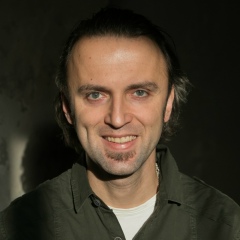Лучшая фраза Кобейна
Обычно, если произнести словосочетание "тексты Курта Кобейна" всем приходит на ум банальная "I Hate Myself and I Want to Die" (на всякий случай это просто пример, а не пропаганда чего-то там). Однако мало кто вспоминает, пожалуй лучшую фразу не только Nirvana, но и всей популярной музыки 90-х. Словно спрятанный водевильным вором-авантюристом шедевр на самом видном месте, эта фраза болтается в Smells like teen spirit, но вряд ли многими запоминается.
Речь о гениальной "I'm worse at what I do best And for this gift I feel blessed" в начале второго куплета. Эта фраза, если на секунду в нее вдуматься, несет потрясающий заряд экзистенциальности, окончательная точка, мера всех вещей, абсолютный ноль.
Как-то раз мы с одним из моих лучших друзей говорили о творчестве Маркиза де Сада, и он (друг, не Сад, хвала Силе) высказал очень тонкую мысль. А что если трактовать идею полоумного французского аристократа не через примитивный фрейдизм про то, что секс и насилие крепко связаны у млекопитающих? Что если дело в Сарторовском поиске ощущения реальности. Современный мир требует от нас счастья, мы просто обязаны быть счастливыми, иначе общество нами недовольно, мы сами собой недовольны. Поэтому нам сложно понять правда ли мы испытываем счастье, или убеждаем себя в этом. И только боль может быть безусловно реальной - ведь мы ее не хотим, а значит нам незачем убеждать себя в ее существовании. Не знаю чтобы сказал на эти размышления сам Сад, возможно, послал бы нас в баню и пошел бы дальше писать свои романы. Но идея от того не менее интересна.
То же самое и с упомянутой фразой - мир требует от нас успеха, карьеры, попадания в десятки, топы, списки. Но даже достигнув в них каких-то отметок мы не можем быть уверены, что это правда наша цель, что мы действительно заслуживаем этого места. И только осознание неряшливо брошенного на тетрадный листок шедевра Кобейна вдруг дает нам ощущение свободы. Ведь лишь отказавшись бороться за победы мы можем избежать поражения. Водрузив эту фразу на знамя, как девиз, можно пуститься в путь Дон Кихота, который никуда не ведет, но позволяет снять нелепые маски с действительности.
В этом смысле это почти пресловутое сократовское "Я знаю что ничего не знаю", картезианское cogito.
В общем...
"I'm worse at what I do best And for this gift I feel blessed"
Обычно, если произнести словосочетание "тексты Курта Кобейна" всем приходит на ум банальная "I Hate Myself and I Want to Die" (на всякий случай это просто пример, а не пропаганда чего-то там). Однако мало кто вспоминает, пожалуй лучшую фразу не только Nirvana, но и всей популярной музыки 90-х. Словно спрятанный водевильным вором-авантюристом шедевр на самом видном месте, эта фраза болтается в Smells like teen spirit, но вряд ли многими запоминается.
Речь о гениальной "I'm worse at what I do best And for this gift I feel blessed" в начале второго куплета. Эта фраза, если на секунду в нее вдуматься, несет потрясающий заряд экзистенциальности, окончательная точка, мера всех вещей, абсолютный ноль.
Как-то раз мы с одним из моих лучших друзей говорили о творчестве Маркиза де Сада, и он (друг, не Сад, хвала Силе) высказал очень тонкую мысль. А что если трактовать идею полоумного французского аристократа не через примитивный фрейдизм про то, что секс и насилие крепко связаны у млекопитающих? Что если дело в Сарторовском поиске ощущения реальности. Современный мир требует от нас счастья, мы просто обязаны быть счастливыми, иначе общество нами недовольно, мы сами собой недовольны. Поэтому нам сложно понять правда ли мы испытываем счастье, или убеждаем себя в этом. И только боль может быть безусловно реальной - ведь мы ее не хотим, а значит нам незачем убеждать себя в ее существовании. Не знаю чтобы сказал на эти размышления сам Сад, возможно, послал бы нас в баню и пошел бы дальше писать свои романы. Но идея от того не менее интересна.
То же самое и с упомянутой фразой - мир требует от нас успеха, карьеры, попадания в десятки, топы, списки. Но даже достигнув в них каких-то отметок мы не можем быть уверены, что это правда наша цель, что мы действительно заслуживаем этого места. И только осознание неряшливо брошенного на тетрадный листок шедевра Кобейна вдруг дает нам ощущение свободы. Ведь лишь отказавшись бороться за победы мы можем избежать поражения. Водрузив эту фразу на знамя, как девиз, можно пуститься в путь Дон Кихота, который никуда не ведет, но позволяет снять нелепые маски с действительности.
В этом смысле это почти пресловутое сократовское "Я знаю что ничего не знаю", картезианское cogito.
В общем...
"I'm worse at what I do best And for this gift I feel blessed"
Cobain's best phrase
Usually, if you pronounce the phrase “Kurt Cobain’s texts”, the commonplace “I Hate Myself and I Want to Die” comes to everyone’s mind (just in case, this is just an example, not propaganda of something there). However, few people remember, perhaps the best phrase, not only Nirvana, but also all the popular music of the 90s. As if a masterpiece hidden in a vaudeville thief-adventurer in a prominent place, this phrase hangs in Smells like teen spirit, but is unlikely to be remembered by many.
It's about the ingenious "I'm worse at what I do best And for this gift I feel blessed" at the beginning of the second verse. This phrase, if you think about it for a second, carries a tremendous charge of existentiality, the final point, the measure of all things, an absolute zero.
Once, one of my best friends and I spoke about the work of the Marquis de Sade, and he (a friend, not Sad, praise Sile) expressed a very subtle thought. But what if the idea of a crazy French aristocrat is not interpreted through primitive Freudianism about the fact that sex and violence are tightly connected in mammals? What if the matter is in the Sartorovsky search for a sense of reality. The modern world requires us to be happy, we simply must be happy, otherwise society is dissatisfied with us, we ourselves are dissatisfied. Therefore, it is difficult for us to understand whether we are really experiencing happiness, or convince ourselves of this. And only pain can certainly be real - because we do not want it, which means we do not need to convince ourselves of its existence. I don’t know if Sad himself would have said these thoughts, perhaps he would send us to the bathhouse and go on writing his novels. But the idea is no less interesting.
The same thing with the phrase mentioned - the world requires us success, career, getting into the tens, tops, lists. But even having reached some marks in them, we cannot be sure that this is really our goal, that we really deserve this place. And only the awareness of Cobain’s masterpiece sloppy thrown on a notebook sheet suddenly gives us a sense of freedom. After all, only by refusing to fight for victory can we avoid defeat. Having put this phrase on the banner, as a motto, you can embark on the path of Don Quixote, who does not lead anywhere, but allows you to remove ridiculous masks from reality.
In this sense, it’s almost the notorious Socratic “I know that I don’t know anything”, a Cartesian cogito.
Generally...
"I'm worse at what I do best And for this gift I feel blessed"
Usually, if you pronounce the phrase “Kurt Cobain’s texts”, the commonplace “I Hate Myself and I Want to Die” comes to everyone’s mind (just in case, this is just an example, not propaganda of something there). However, few people remember, perhaps the best phrase, not only Nirvana, but also all the popular music of the 90s. As if a masterpiece hidden in a vaudeville thief-adventurer in a prominent place, this phrase hangs in Smells like teen spirit, but is unlikely to be remembered by many.
It's about the ingenious "I'm worse at what I do best And for this gift I feel blessed" at the beginning of the second verse. This phrase, if you think about it for a second, carries a tremendous charge of existentiality, the final point, the measure of all things, an absolute zero.
Once, one of my best friends and I spoke about the work of the Marquis de Sade, and he (a friend, not Sad, praise Sile) expressed a very subtle thought. But what if the idea of a crazy French aristocrat is not interpreted through primitive Freudianism about the fact that sex and violence are tightly connected in mammals? What if the matter is in the Sartorovsky search for a sense of reality. The modern world requires us to be happy, we simply must be happy, otherwise society is dissatisfied with us, we ourselves are dissatisfied. Therefore, it is difficult for us to understand whether we are really experiencing happiness, or convince ourselves of this. And only pain can certainly be real - because we do not want it, which means we do not need to convince ourselves of its existence. I don’t know if Sad himself would have said these thoughts, perhaps he would send us to the bathhouse and go on writing his novels. But the idea is no less interesting.
The same thing with the phrase mentioned - the world requires us success, career, getting into the tens, tops, lists. But even having reached some marks in them, we cannot be sure that this is really our goal, that we really deserve this place. And only the awareness of Cobain’s masterpiece sloppy thrown on a notebook sheet suddenly gives us a sense of freedom. After all, only by refusing to fight for victory can we avoid defeat. Having put this phrase on the banner, as a motto, you can embark on the path of Don Quixote, who does not lead anywhere, but allows you to remove ridiculous masks from reality.
In this sense, it’s almost the notorious Socratic “I know that I don’t know anything”, a Cartesian cogito.
Generally...
"I'm worse at what I do best And for this gift I feel blessed"
У записи 3 лайков,
0 репостов,
215 просмотров.
0 репостов,
215 просмотров.
Эту запись оставил(а) на своей стене Константин Крылов























